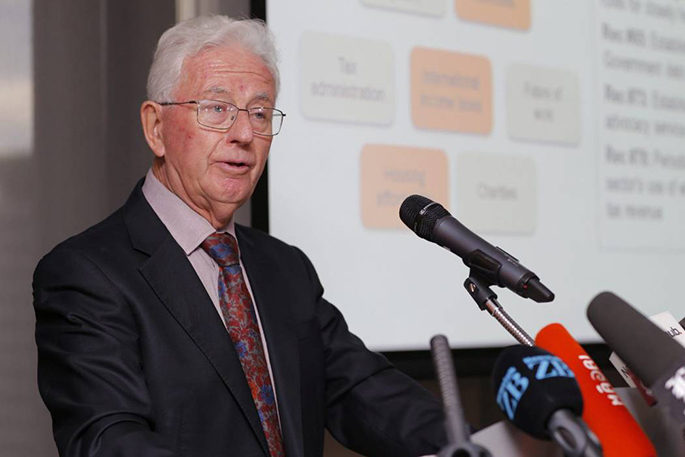Health Minister Dr David Clark has appointed Sir Michael Cullen as the new chair of the Bay of Plenty DHB.
Dr Clark has today announced four Board appointments to each DHB, as well as naming the chairs and their deputies.
In the Bay of Plenty, Sir Michael Cullen (chair), Sharon Shea (deputy chair), Leonie Simson and Arihia Tuoro were appointed to join the members elected in the local body elections in October.
Sir Michael Cullen's former roles include Deputy Prime Minister, Minister of Finance, Minister of Tertiary Education and Attorney-General. He was the Deputy Leader of the Labour Party from 1996 until November 2008. He has a Master of Arts in History from the University of Canterbury. Sir Michael subsequently received a Commonwealth Scholarship and gained a PhD in social and economic history from the University of Edinburgh. On 16 December 2009, he received an honorary LLD from the University of Otago in recognition of "his contributions as an Otago academic and as a respected and highly influential politician".
'District Health Boards play a vital role delivering health care to New Zealanders. It's critical that they are well led, and well governed,” says David.
'I'm delighted that Sir Michael has agreed to take on the important role of leading his local DHB.
'A former Minister of Finance and Deputy Prime Minister, Sir Michael will bring huge experience and a formidable intellect to the role.
'DHB board governance is not an easy job. It requires leadership, focus, a strong skillset and a commitment to delivering high quality care for all New Zealanders.”
Sharon Shea, new deputy chair, is a current appointed board member at Northland DHB. She began her career as a lawyer at Kensington Swan in Auckland and then moved into the health sector where she has held a range of senior management roles in government and non-government organisations, focusing on Maori health improvement. In 2009 Ms Shea set up Shea Pita and Associates Limited, where she is a Director and Principal Consultant. Ms Shea graduated from Oxford University at the top of her class with an MSc in Comparative Social Policy (Distinction), and also holds a Bachelor of Laws and a Bachelor of Arts from Auckland University.
Leonie Simpson is currently Manahautu of Te Runanga o Ngati Awa. Prior to this she worked at the Runanga and helped developed the tribe's 'Ngati Awa Te Toki' plan. Leonie has varied govenernance experience which includes being a member of Te Kahui Matauranga and Chair of the Ngati Haupoto Trust. She is also an Associate Member of the Institute of Directors. Ms Simpsons holds a Bachelor of Laws and a Bachelor of Arts (Maori) from the University of Auckland.
Arihia Tuoro is a Project Manager for Whakatohea Pre Settlement Claims Trust. Her previous roles include Trustee of Te Puna Ora o Mataatua Healthcare Service Provider, Elected Councillor of Opotiki District Council, Chair of the Audit and Risk Opotiki District Council and Elected Trustee of the Whakatohea Maori Trust Board. She has a Diploma in Corporate Management from the NZ Institute of Chartered Secretaries and Administrators and a Master of Business in International Business Management from Asia Pacific International Graduate School of Management. She is also a member of the Institute of Directors New Zealand.
The Minister of Health has appointed 13 new health board chairs in a 'changing of the guard'. Two former Labour ministers, two former mayors and a retired High Court judge are among the newly appointed district health board chairs.
David has announced 76 appointments to 19 DHBs around the country and named 13 new chairs, including four who are Maori, in what he described as a significant changing of the guard. Some of the appointed members were reinstated.
According to an Official Information Act response from June, last year DHB chairs earned between $33,600 and $61,000, depending on the health board.
It is no secret DHBs are facing challenges, David says. "Nine years of underfunding and neglect has taken its toll – with rundown hospitals, workforces that have been stretched too thinly and worsening DHB deficits since 2013."
All 20 DHBs were in the red for the year to June, posting a collective deficit of more than $1 billion. About $666 million of this was one-off costs, including $590m for fixing past compliance issues with the Holidays Act.
In Budget 2019, the Government put $19.8b into health for 2019/20, including $13.9b for DHBs. While Clark has referred to record Government spending on health, a joint union analysis found the spend was still about $134m short of what was needed to cover new services, increasing costs, population growth and the impact of an ageing population.
'I expect the new DHB boards to deliver on the Government's clear expectations – in particular, robust financial management, improved services and good management of capital infrastructure,” says David.
'While there are a range of ongoing challenging issues in health, timely access to services remains a key priority. For example, there needs to be meaningful improvement in access to first specialist assessments, surgery and radiology so people get the care they need.
'To help them to succeed, board chairs and members will be supported by an improved induction and development programme. This will ensure DHB boards have the support they need to provide strong governance and leadership.
'I also want to pay tribute to outgoing board members and thank them for their service – particularly Sally Webb.
'Sally served three terms as chair and as such could not be reappointed. In my experience she was a strong and committed chair, who worked tirelessly for her community,” says David.
DHB boards are made up of up to 11 people, seven elected members and up to four appointed.
(Additional reporting by Stuff)



0 comments
Leave a Comment
You must be logged in to make a comment.